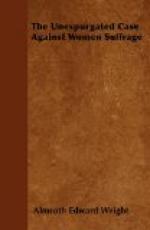But the feminist will want to argue. She will—taking it as always for granted that woman has a right to all that men’s hands or brains have fashioned—argue that it is very important for the intellectual development of woman that she should have exactly the same opportunities as man. And she will, scouting [rejecting with contempt] the idea of any differences between the intelligences of man and woman, discourse to you of their intimate affinity.
It will, perhaps, be well to clear up these points.
The importance of the higher development of woman is unquestionable.
But after all it is the intellect of man which really comes into account in connexion with “the mass of mental faculties available for the higher service of mankind.”
The maintenance of the conditions which allow of man’s doing his best intellectual work is therefore an interest which is superior to that of the intellectual development of woman. And woman might quite properly be referred for her intellectual development to instructional institutions which should be special to herself.
Coming to the question of the intimate resemblances between the masculine and the feminine intelligence, no man would be venturesome enough to dispute these, but he may be pardoned if he thinks—one would hope in no spirit of exaltation—also of the differences.
We have an instructive analogy in connexion with the learned societies.
It is uncontrovertible that every candidate for election into such a society will have, and will feel that he has, affinities with the members of that association. And he is invited to set these forth in his application. But there may also be differences of which he is not sensible. On that question the electors are the judges; and they are the final court of appeal.
There would seem to be here a moral which the feminist would do well to lay to heart.
There is also another lesson which she might very profitably consider. A quite small difference will often constitute as effective a bar to a useful and congenial co-operation as a more fundamental difference.
In the case of a body of intellectual workers one might at first sight suppose that so small a distinction as that of belonging to a different nationality—sex, of course, is an infinitely profounder difference—would not be a bar to unrestricted intellectual co-operation.
But in point of fact it is in every country, in every learned society, a uniform rule that when foreign scientists or scholars are admitted they are placed not on the ordinary list of working members, but on a special list.
One discerns that there is justification for this in the fact that a foreigner would in certain eventualities be an incompatible person.
One may think of the eventuality of the learned society deciding to recognise a national service, or to take part in a national movement. And one is not sure that a foreigner might not be an incompatible person in the eventuality of a scientist or scholar belonging to a nationality with which the foreigner’s country was at feud being brought forward for election. And he would, of course, be an impossible person in a society if he were, in a spirit of chauvinism, to press for a larger representation of his own fellow-countrymen.




